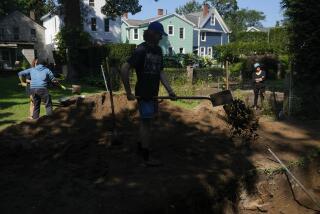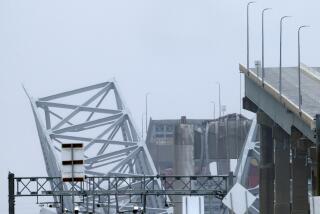WTC find rekindles debate over remains
- Share via
NEW YORK — At 9 a.m., ground zero had come to life: Hundreds of financial workers were crossing the skywalk clutching muffins and coffee, and construction workers milled around the site of the planned memorial to the victims of the Sept. 11 terrorist attack.
In the commotion, you could almost miss the four forensic investigators at the southwest corner of the site. They zipped themselves into hooded white suits, strapped on goggles, and set about looking for body parts.
After utility workers came across foot-long segments of bone in an abandoned manhole at the edge of the World Trade Center site Oct. 19, the city revived a recovery effort that had ended in 2002. A week later, authorities have found 200 pieces of victims’ bodies in the same manhole.
The discoveries have renewed a debate over whether the city tried hard enough to find the dead in the midst of a large-scale cleanup. Although medical examiners have analyzed 20,730 bodies and body parts retrieved at the site, no remains have been found for 40% of the people who died, according to Grace Burgess, a spokeswoman for Chief Medical Examiner Charles Hirsch.
Mayor Michael R. Bloomberg has vigorously defended the recovery and cleanup operations, which were overseen by the city’s Fire Department and Department of Design and Construction.
“Families really wanted to get any remains back as quickly as possible,” he said.
“They did it under budget, they did it with no lives lost, and they did a spectacular job,” he said of the workers. “I don’t know why everybody isn’t just looking back and saying, given the scope of it, they should receive nothing but praise.”
This is not the first time workmen have come across body parts in the course of rebuilding Lower Manhattan. This summer, workers preparing the 41-story Deutsche Bank building for demolition found 760 fragments of human remains, mostly small bone chips mixed in with gravel on its roof.
Critics -- including the families of several victims -- say the city should have brought in teams of forensic anthropologists to sift through debris at the site. This week, their complaints were joined by two former ground zero officials, who told the Associated Press that the cleanup was rushed to a conclusion when more remains could have been retrieved.
“I knew that this was going to happen because they really just wanted us out of there,” said retired police Lt. John McArdle, former ground zero commander, one of the officials who spoke to the Associated Press. “There was not a good exit strategy for some of those places, and if there was, it was poorly done.”
The recovery of remains began when the debris was still smoking and piled 10 stories high. The Department of Design and Construction oversaw truckers, crane operators and ironworkers as they dismantled the wreckage.
Firefighters were in charge of retrieving remains. Recovery would not end until “they really got down to bedrock,” said Fire Department spokesman Frank Gribbon. He said commanders signed off on each sector of the site, voiced no reservations about whether bodies remained in the wreckage and cared passionately about finding whatever remains they could.
“The folks who did this did it with broken hearts, but with an incredible amount of courage and commitment,” he said.
The site was handed over to the Port Authority on May 30, 2002 -- months before the DDC’s deadline, and $700 million under budget. Bloomberg said the timeline was driven by consideration for victim’s families, who were desperate to receive whatever remains could be found.
“Nobody suggested that we were going to start construction right away,” he said. “The only issue was how you do it safely and as respectfully and as quickly as you possibly could.”
Charles Wolf, whose wife was killed in the attack, said he would like Bloomberg to bring in forensic anthropologists from the Joint POW/MIA Accounting Command, which is typically charged with retrieving the remains of soldiers lost in combat. Firefighters and other recovery workers “did a tremendous job, but they’re not anthropologists,” Wolf said.
“I don’t think I’m ever going to find any part of my wife’s body,” Wolf said. However, “it’s not about me and my wife. We need someone to come in and cut through all the lines and get the whole search done.”
*
More to Read
Sign up for Essential California
The most important California stories and recommendations in your inbox every morning.
You may occasionally receive promotional content from the Los Angeles Times.












